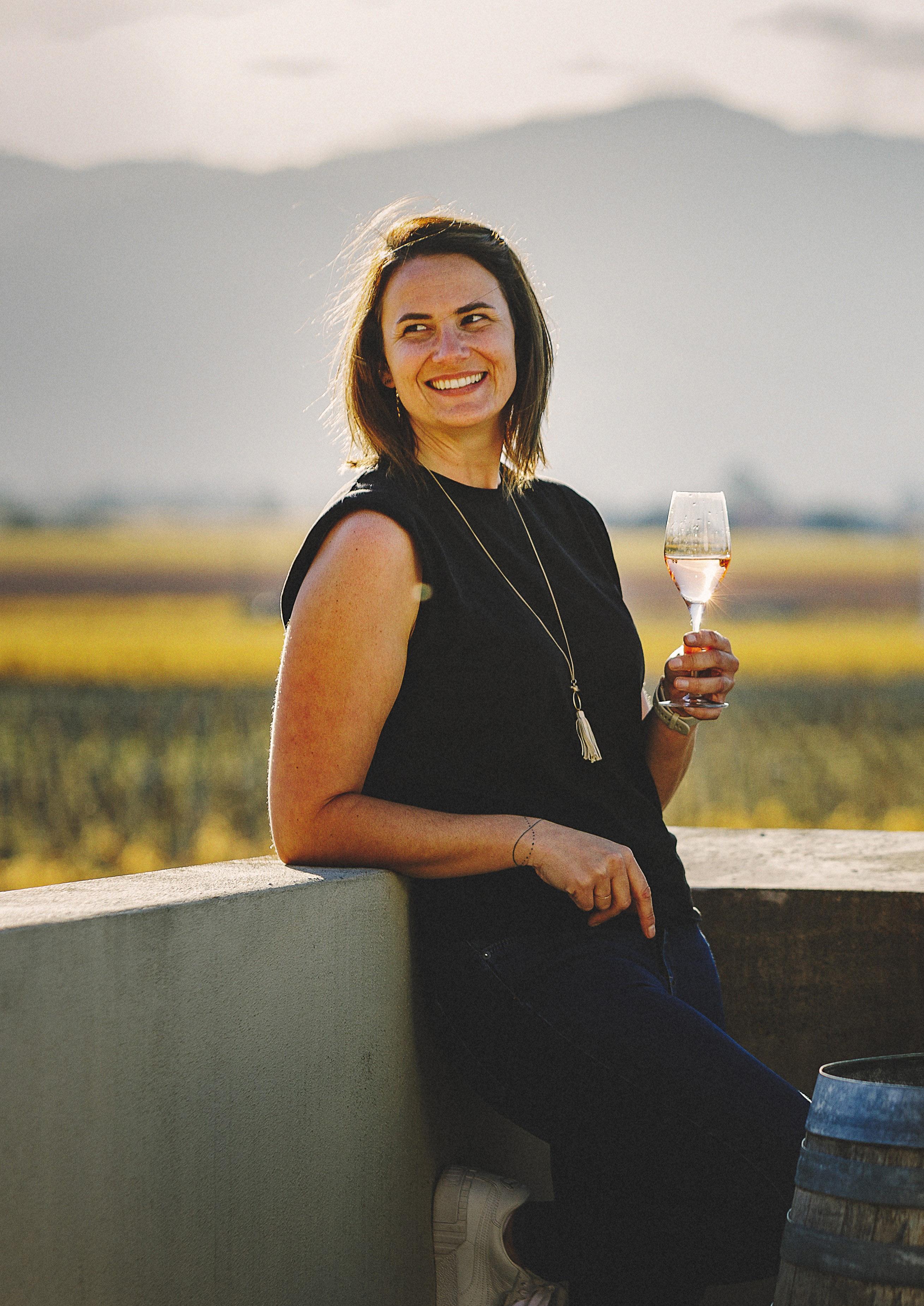Annual
EDUCATE



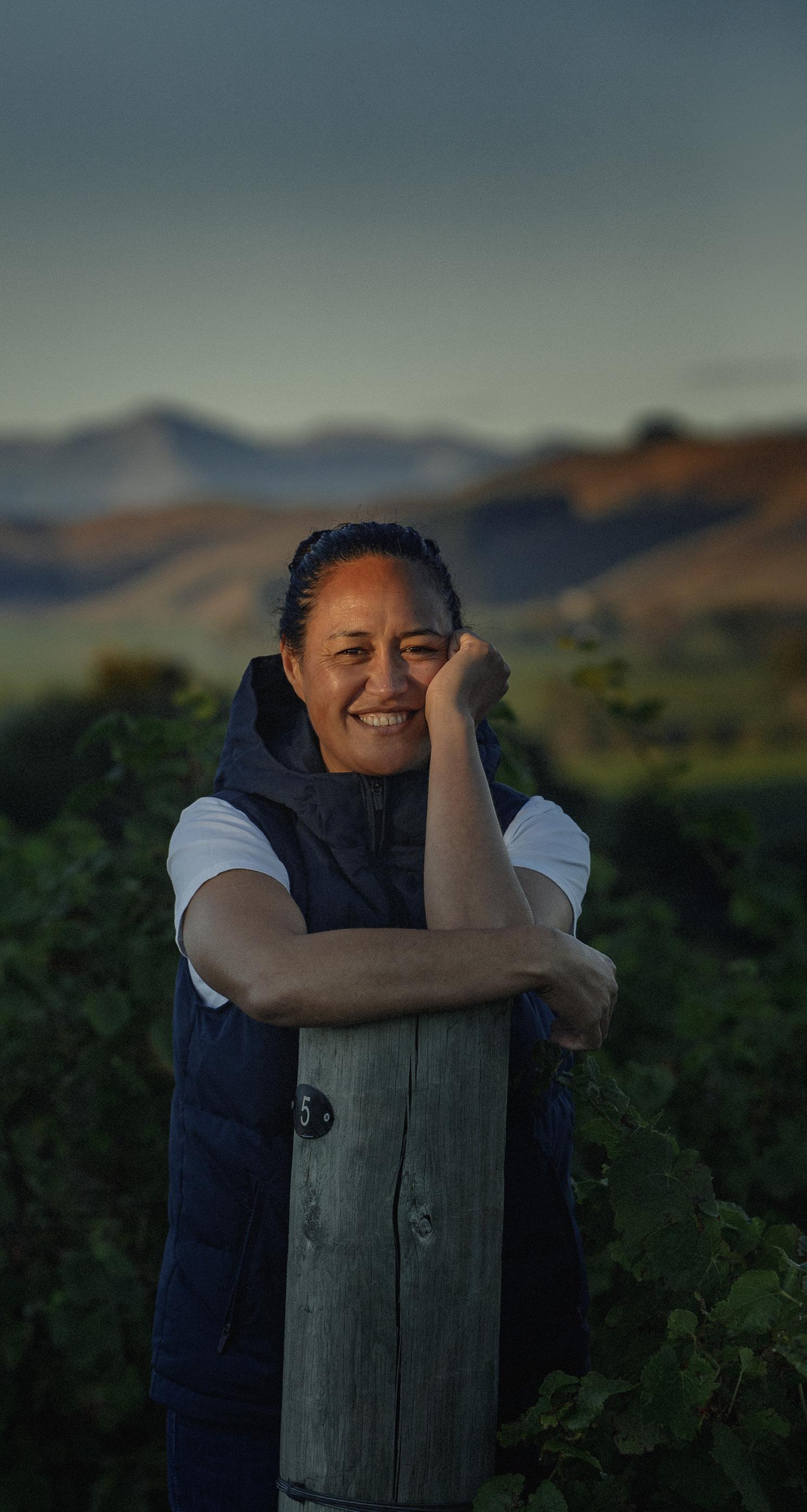
I WOULD like to use this Annual Report to reflect on the past year. Many of the challenges we have faced resulted from factors beyond our control, including a global pandemic and the wild cards dealt by Mother Nature, including the small vintage of 2021, followed by our largest ever vintage in 2022. More recently we have seen 100-year floods and subsequent damage.
Throughout this turbulent time the Marlborough wine industry has continued to prove itself as mature, resilient, connected and organised. It is these traits that have helped us move forwards, rather than succumb to the pressures around us.
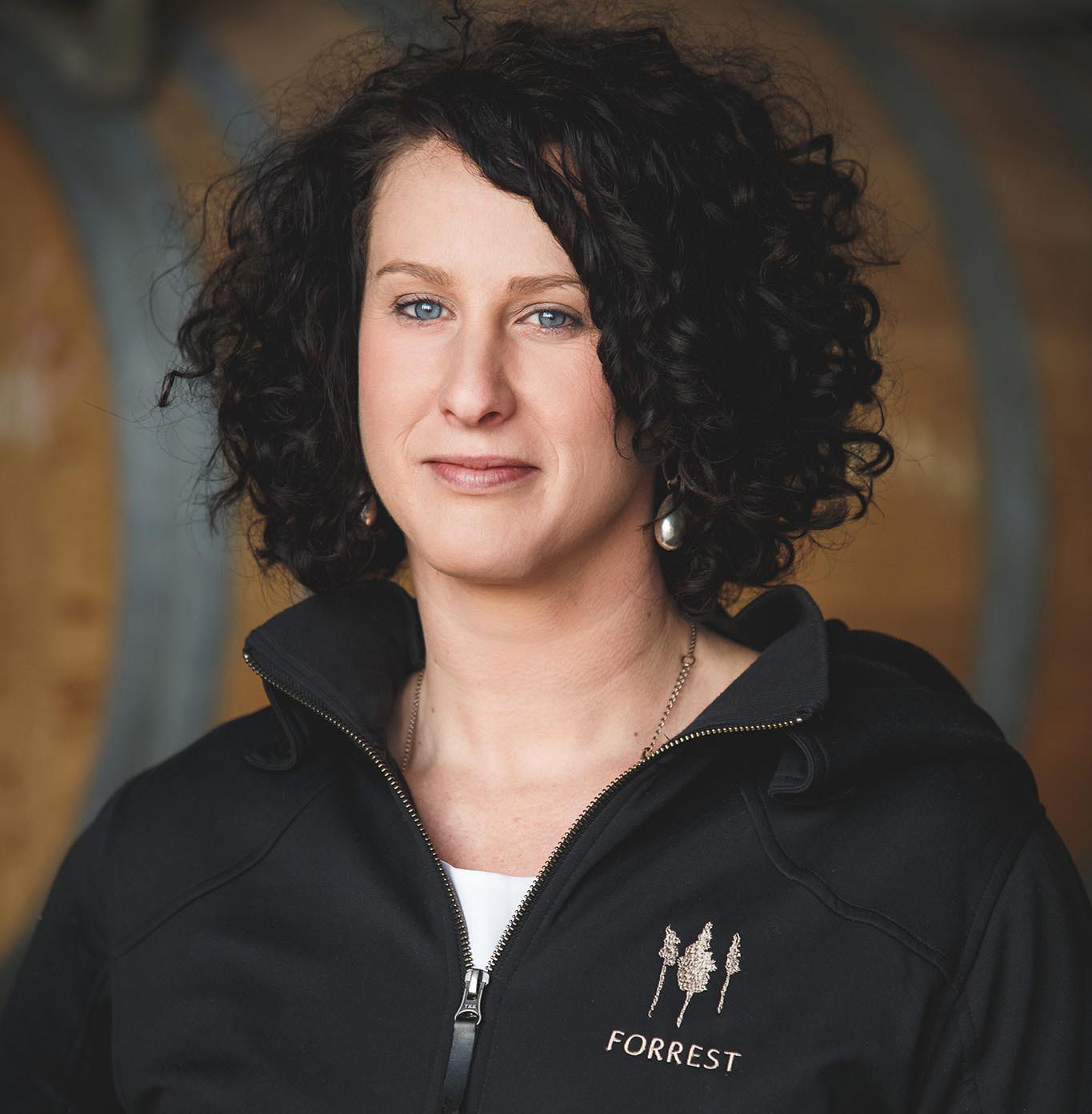
Our people deserve celebration and thanks. It goes without saying that the workforce - in the field, in our wineries and in the operational side of the industry - have dug deep to create success for the businesses they are part of, and for New Zealand Inc, which benefits from a strong wine sector. Without this drive and determination, we wouldn’t have managed through this chaotic period.
The winter workforce - facing long stays, uncertainty and shortages - managed to complete 2021 pruning just before budburst. This season looks to be early and require just as much commitment and management of resources to get the job done. The summer workforce was also extremely limited, causing serious challenges due to a difficult growing season and larger than ever crop. Many of our seasonal workers have been here for a long time due to border closures, and we need to thank them and praise their contributions to our shared success.
It has been extremely disappointing to see recent headlines pointing to ‘blatant exploitation’ of our Recognised Seasonal Employer (RSE) scheme workforce; headlines that have not been seen for many years. While this stings, it has been encouraging to receive calls and emails expressing both concern and anger from industry members, asking if this really happens in our sector. We await findings from current investigations and fully support the pending review of the RSE scheme. This vital scheme must be balanced, fit for purpose, and have the outcomes that all participants require.
Wine Marlborough, New Zealand Winegrowers (NZW) and others are sending increasingly forceful communication to members on the expectations of our industry around fair
and ethical employment. We wholly support this; we have never tolerated anything less. The bar is high, and that has never been more important for our industry than it is now.
At the forefront of our Wine Marlborough labour force work plan has been attraction to our sector, with campaigns around vintage recruitment, establishing a pruning survey to give meaningful progress reports, and gathering and sharing anonymised remuneration data for vintage staff to help wineries. These tools have proved invaluable, and are described in greater depth later in this report.
Vintage 2022 was surely one of the most challenging to date. A large crop under unfavourable weather pressures, wineries with the least experienced workforce ever, and Covid surging south towards Marlborough, placed significant strain on us all. Without your hard work, and the resulting replenishment of wine volumes, the industry would be extremely challenged.
Details about the 2022 vintage, in terms of size and growth on vintage 2021, are recorded on page 4 of this report. Despite our setbacks, we remain optimistic. Grape sales and wine volumes are at record highs, inflation will eventually ebb, and shipping and supply chains will repair themselves. We are resilient and we must remain so to move through the challenging year ahead.
We are increasingly required to live with the effects of climate change on our operations. Wine Marlborough is committed to highlighting environmental benchmarks in the year ahead, in collaboration with the NZW environment
“We are resilient, and we must remain so to move through the challenging year ahead.”
Beth Forrest
team, using these to find examples of positive actions that we can share with you. We now look ahead to exciting projects such as re-staging the Marlborough Wine & Food Festival and assisting the team at Wine Marlborough to deliver on their annual plan (page 12), which will have positive impacts on the Marlborough wine industry as a whole.
The board fully supports the efforts of the small Wine Marlborough team to make a difference, thanks to its connection to the pulse of the region's wine industry. That will only be enhanced through a focus on elements the
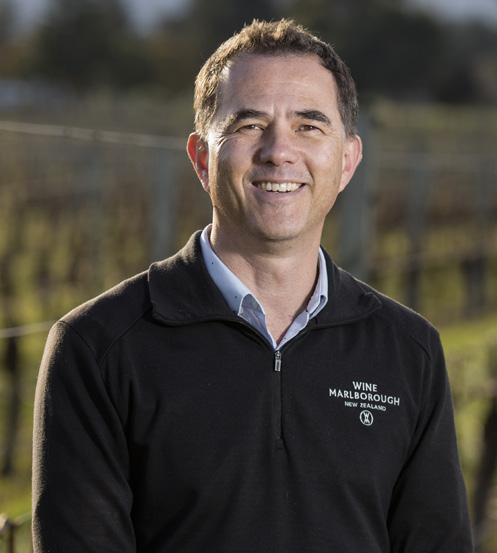
We normally report to our members in November, but have decided to bring this forward to align more closely with the cycles of your businesses, and closer to the end of our financial year in June.
This Annual Report’s span of coverage is therefore shorter than is typical, and does not cover anything reported on in the last annual report. In the future, it would be ideal to report to you in September, to help celebrate the start of the grape growing year and wrap the last one down.
And what a year it has been. Our business reflects yours, and rolling from issue to issue has consumed our attention, like it has yours. We all hope this challenging environment settles down so we can return to normal business conditions and help all involved in the industry rebuild their energy levels. Everyone has dug deep.
A special mention must be made to those who have been isolated away from families, while sharing their valuable skills with our industry. It is pleasing that repatriation of Recognised Seasonal Employer (RSE) scheme workers home to their Pacific Island nations has stepped up. There is a significant exchange of workers returning home and new people arriving. We must continue to nurture our RSE talent, develop their skills, and accomodate and pay them well for their sacrifices and dedicated hard work. There is no room for mistreatment of any kind, and that’s why we are fully supportive of the RSE scheme review. We will champion positive outcomes for the people involved, whilst supporting and improving all the strong elements of a scheme we are so privileged to access.
The RSE scheme by no means solves all our labour issues, and labour is one of our highest priority projects. We are fortunate to have such a capable advocacy manager at Wine Marlborough – Nicci Armour – leading this.
The highlight for the team at Wine Marlborough has been the commitment to, and development of, a fit for purpose annual plan. We will use this to focus more of our work on activities that advance our strategic goals in areas
annual plan commits to.
The Marlborough Winegrowers Board (MWG) also submitted, and have views on, the NZW governance, representation and levies review, and will be closely involved in related discussions. It has been pleasing to welcome Nigel Sowman, Michiel Eradus, Damien Yvon and James Macdonald to the board – all are making their presence felt. We farewell Kirsty Harkness after completing her term and welcome Andrew Nation.
Thank you, Beth Forrest, chair MWG.such as community, people, communications, data and information, environment, members and corporate social responsibility.
This report is presented under our strategic pillarsEducate, Grow, Protect, and Celebrate. Having a work plan to advance our strategy has been a significant collaborative team project. We will report on our progress to the board at meetings, and to members through the activities involved.
We communicate much of the information on what we do, along with your news, through the wonderful Winepress magazine. Thank you to editor Sophie Preece for crafting and delivering this fantastic magazine, made free to members every month.
Our communications and marketing are managed by Sarah Linklater. Sarah draws on insights and benchmarks to help us understand how the Marlborough wine industry is positioned and perceived, and has done so much to influence this. Thank you, Sarah, for your significant contribution.
Apart from our keynote Marlborough Wine & Food Festival, events continued over the past 12 months, albeit with significant modifications. Loren Coffey, our event manager, has had a challenging year, but has continued to reshape our events, renegotiate with our sponsors, and shine a light on all involved with the activities we have been able to deliver. Loren has dug deep to refresh the purpose and objectives for all of our events to set us up for a relaunch of those activities.
In closing, we are excited about the year ahead and aiming to deliver a lot of value for our members. The past few years have been a rollercoaster of challenges, but our industry at large, and Wine Marlborough as your industry body, has used each hurdle to grow stronger and more resilient.
Thank you, Marcus Pickens, Wine Marlborough general manager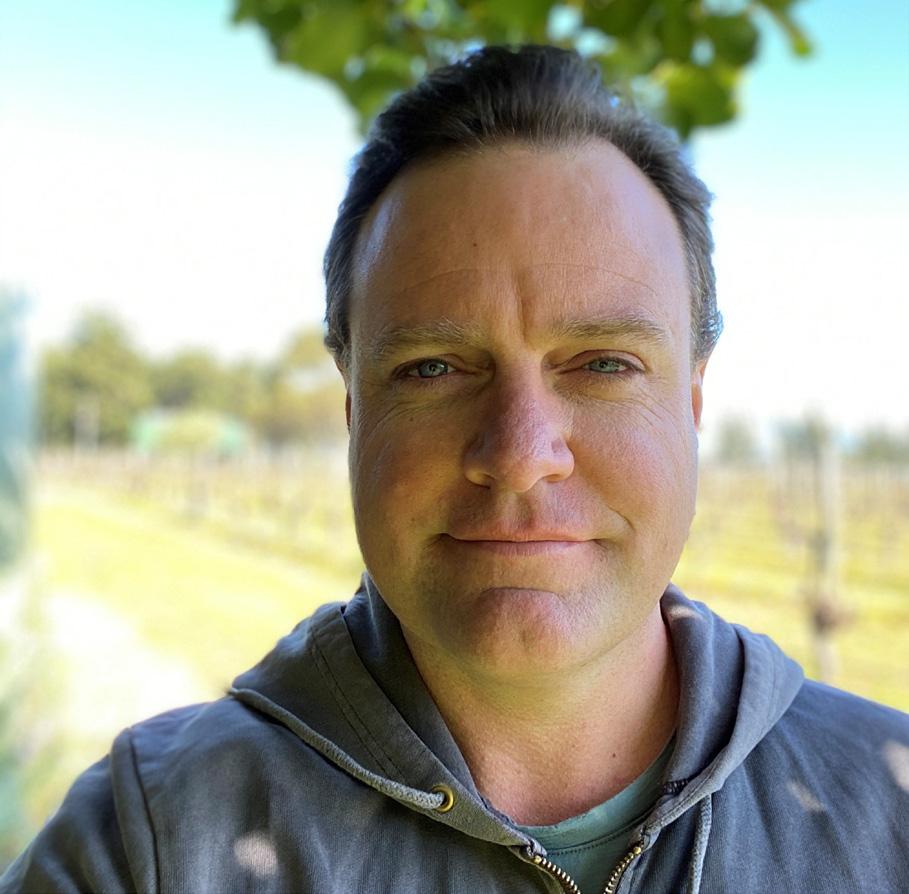 GUS ALTSCHWAGER
GUS ALTSCHWAGER
YOU WILL see from the substance of the Marlborough Winegrowers Association annual report the scope of the work that the organisation takes on each year. Marlborough is by far the most important wine growing region in New Zealand. It contains the most growers, the most wine companies, produces the most wine, and wraps around the region like a cloak.
It is critical that the organisation is funded appropriately through the Levy Commodities contribution that you as members make to New Zealand Winegrowers (NZW). We will be taking an active stance in the NZW governance and funding review to test the model for fairness and equity.
Wine Marlborough has been, in part, able to deliver so well for members because of the contribution of other revenue generating activities. One in particular delivers significant and stable returns: the Marlborough Wine & Food Festival. Take this away and it threatens the viability of the organisation’s current delivery.
We have now had two years of this activity not
do it. Despite the positive financial contribution it makes to this organisation, this is not the primary reason it has been run and managed by Wine Marlborough for so long. Not holding it has reinforced the special place it has both for the wine company participants and our community, who are so proud of the event. From a financial perspective, a significant contingency has been built into the event for 2023, due to potential new site costs and inflation – it being two years since we delivered the event.
Overall, net income for the year was down from core levy funding from NZW by 6% due to the small harvest in 2021, to $469,809. Winepress has been a star performer financially, with a record result on the back of strong advertising support.
Despite the festival not returning the revenue we forecast and needed, other events delivered well and
proceeding. In 2021 we didn’t even get close, but last year was closer, with the decision to hold off not made until December. One reason we continued to plan the event was an underwrite from the government for large scale events, which would guarantee a pay-out for core expenses if alert levels changed.
Before this occurred, we went to members to check the appetite, as we always knew there could be a risk to harvest of staging the event. It was the result of this enquiry that made the decision an easy one. It was through careful management, and the government grant that the festival was able to post a profit despite its cancellation.
The board and staff have used the time without the festival to consider what it means to us, and to test why we
generated much needed income. Thank you to sponsors and committees for supporting these activites. Overall, the organisation had a cash surplus of $21,440 before depreciation and amortisation ($16,909) reducing the net profit to $4,531.
Looking ahead, a key project for the board is to develop a reserves policy that will define the treatment of reserves the organisation has accumulated over time. Key questions to be answered include: How much is appropriate for an organisation with our purpose? What can they be used for? And how can they be rebuilt if used? We will report back to our members in due course when this review is completed. Thank you, Gus Altschwager, treasurer MWG
“It is critical that the organisation is funded appropriately through the Levy Commodities contribution that you as members make to New Zealand Winegrowers.”
Gus AltschwagerGus Altschwager
Marlborough’s 2022 vintage was “edge-of-your-seat” stuff with higher yields, inclement weather and a pandemic peak
414,649 tonnes total volume of grapes harvested, which is 80.6% of New Zealand’s 2022 crop. Yields were significantly up on the long-term average, putting companies back in balance after the light 2021 harvest.
54% up on the 2021 vintage, which yielded 269,521 tonnes. A very warm October, November and December meant good fruit set, with berry numbers per bunch well up on average, as well as high berry weight. But a cold and wet February meant flexibility was key to getting through a harvest beset by a lack of skilled labour, the impact of Omicron and the pressure of February rain.
363,004 tonnes of the pick was Sauvignon Blanc, making up 87.5% of the region’s total harvest. This was 51% up on the 2021 Marlborough Sauvignon Blanc harvest.
29,415 hectares of producing vineyard land were recorded in the New Zealand Winegrowers Vineyard Report 2022, representing 71% of New Zealand’s producing vineyard area.
This photo Wither Hills Head Winemaker Matt Large says wineries had layers of contingency plans for Vintage 2022, as labour shortages and Omicron loomed. Photo Jim Tannock. February 2022 Winepress.

MARLBOROUGH’S 2022 vintage was “edge-of-your-seat” stuff, with higher yields, inclement weather and the impact of Covid on crews, says Sophie Parker-Thomson, MW.
And it required a change in mindset from industry, following three consecutive drought years and light crops last year. “There has been a temptation to replenish the very empty pipelines with the bountiful yields - principally Sauvignon Blanc,” says Sophie, who owns and runs Blank Canvas Wines with her husband Matt Thomson.
Producers had to be “scrupulous” in balancing that against the processing capacity of their wineries, a widespread shortage of labour, and an Omicron impacted workforce, “as well as the dynamics of ripening crops in La Niña conditions”, Sophie adds.
“Timing was everything” for the vintage, says Plant & Food Research weather expert Rob Agnew, noting that Marlborough growers “dodged a bullet, but not entirely”. December rainfall coincided with flowering, creating latent botrytis infection that was awakened on some blocks by February rain, impacting early Sauvignon Blanc going through véraison, the onset of ripening in grapes. A subsequent “very dry” period, from 20 February to 20 March, was a “godsend” that mitigated the impact, says Rob. “If it had continued to be wet over that four-week period it would have been very ugly.”
A very warm October, November and December meant good fruit set, with berry numbers per bunch well up on average, as well as high berry weight. But a cold and wet February “caught everyone out”, dampening the “powerhouse” ripening period, says Astrolabe owner and Winemaker Simon Waghorn.
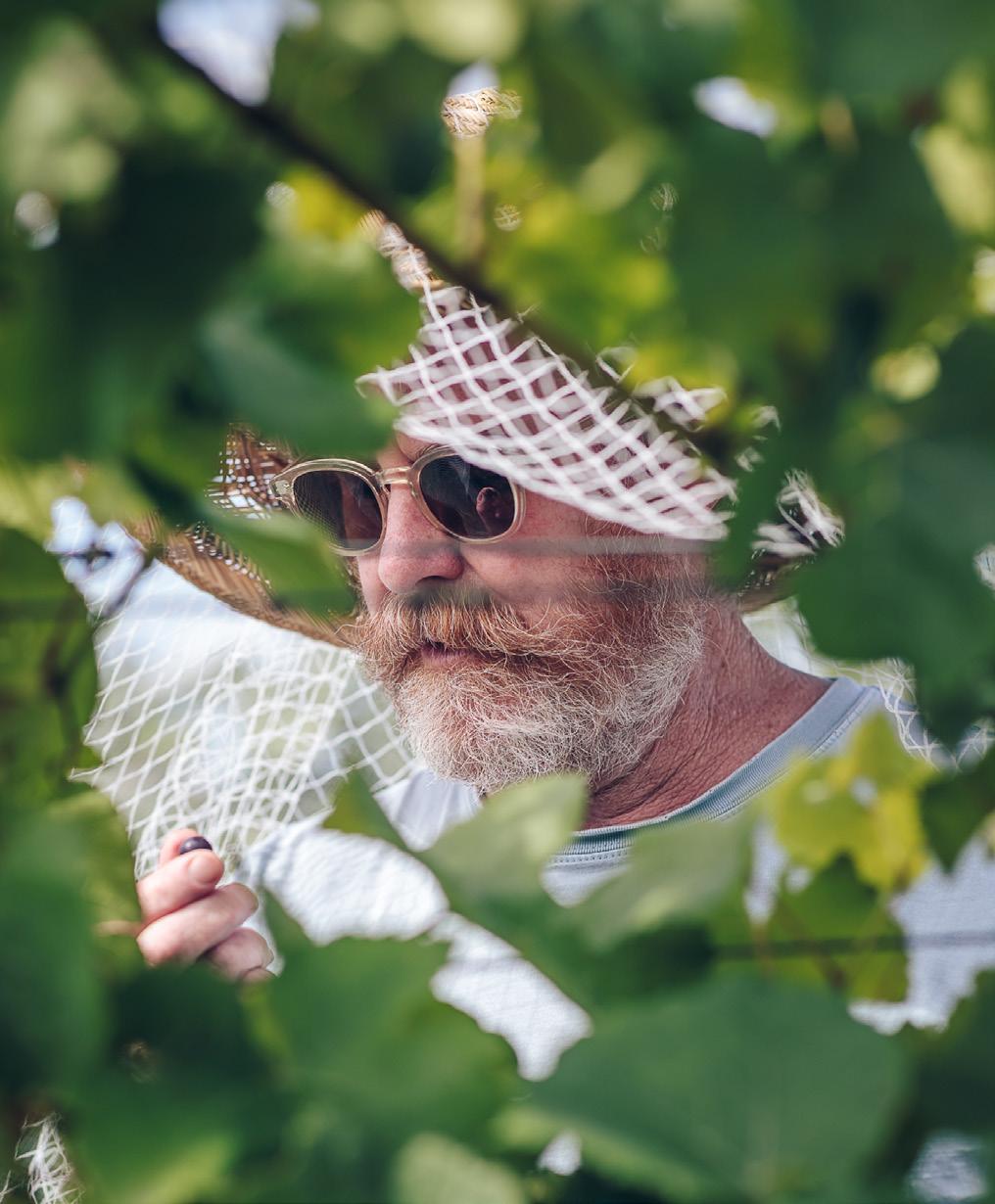
However, those with the luxury of time were rewarded with beautiful autumn conditions, he adds. “We started out with a lot of potential issues, particularly with Sauvignon and Pinot Noir, but the later finer weather kept that in check and meant we could get our fruit to the ripeness levels we were hoping for.”
Pernod Ricard Winemakers Group Winemaker Jamie Marfell says their yields were significantly up on the longterm average, putting the company back in balance after the light 2021 harvest. They had an early start, partly due to the looming threat of Covid-19. “We were very wary of the risk of losing a lot of staff,” says Jamie, a Marlborough Winegrowers Association board member. They contracted three crews for sparkling harvest instead of the typical two,
to spread the risk, and got through “like a dream”.
By mid-March, Omicron started to impact on staff numbers and flexibility became key, with daily workforce decisions, such as closing a shift or slowing machine harvest and grape intake to ensure fruit got to ferment within a 48-hour period, “in pristine condition”. And despite all the Covid and climate challenges of the season, there are “some pretty good stonking wines”, he says. “Commercially they are looking pretty sharp.”
Fellow board member James Macdonald, Senior Winemaker at Hunter’s Wines, agrees flexibility was vital this harvest. And while he’s happy to see the back of it, he’s even happier to have typical tonnage in the tank, including Sauvignon Blanc with ripe fruit flavours that promises to be a “crowd pleaser”. But it’s the Chardonnay that really stood out in 2022, as being “bullet proof in a tricky year”, says James. The Waihopai Valley subregion was a good performer, with later ripening blocks that benefitted from stunning late harvest weather, with the Awatere Valley also providing good yields and flavours, he adds.
Wine Marlborough General Manager Marcus Pickens says it’s been a year of challenges, with supply pressures, labour shortages and global shipping issues causing great stress for companies. “While these things look set to continue to disrupt us, there’s a lot of relief that we successfully navigated vintage 2022.”
“Those with the luxury of time were rewarded with beautiful autumn conditions.”Simon Waghorn
Winepress continues to be one of our most well-received and best-read forms of communication. Each month 800 copies are printed and sent to Marlborough growers, wine companies and key industry personnel across the country. Many of our advertisers have had a place in Winepress since the first edition, and new advertisers have come on board over the years. The scale of advertising allows us to publish more articles for you. Many of the cover photos taken by Jim Tannock over the past year can be found in this annual report
Here’s a recap of the editions from January to July 2022
Insights from industry leaders remained Covid-centric in the January Winepress, including the plethora of pandemic challenges carried through from 2021. Predictions for the year ahead included the looming labour shortages for the 2022 harvest, with lean numbers and light experience on the cellar floor. WineWorks was preparing for the consequences of a slow supply chain and the low yielding 2021 vintage, with many companies booking for an earlier bottling to get stock into market’s clamouring for Marlborough wine. “We know it’s going to come in hot,” said general manager Damien Gillman.
Cellar doors were preparing for a return of international visitors, and Tanya Pouwhare of New Zealand Ethical Employers warned of the chronic stress among contractors in their third year of a Covid labour crisis. The edition also explained the decision to press pause on the Marlborough Wine & Food Festival, in order to safeguard the industry against the risks of Covid-19. “The safety of the community remains a priority,” said Marlborough Winegrowers chair Beth Forrest.
As Marlborough hurtled towards a bumper vintage, with crop levels far higher than the diminutive 2021, Omicron also hurtled down the country. “The timing couldn’t be worse,” said Wither Hills head winemaker Matt Large in the February Winepress. Wine companies prepared with layers and layers of contingency planning, using the learnings of pandemic precautions of 2020 and 2021 to protect their people and processes. The February edition introduced some of the stellar cellar hands jumping into the wine industry in the preparations for harvest, including international workers who’d extended their stay since Covid first closed borders. “All I can do is try my best to stay positive and know that I have ended up in one of the best places in the world,” said American national Allison Hassler.
As harvest took over, stress levels in Marlborough were high, with tropical cyclones thick in the air and Omicron spreading rapidly. People spoke of the pressure of being at the coalface of vintage - busy in vineyards and wineries - but also of the impact of isolation on those sent home from work. A bubble of one at the kitchen table can be a lonely place when the rest of the workforce is pumping, said one industry member.
With wine supplies running out in markets around the world, due to the light 2021 harvest and sluggish supply lines, the pressure was on for a successful and bountiful harvest. “For some wineries, there has been quite simply just not enough wine to go around,” New Zealand Winegrowers chief executive Philip Gregan said at the time.
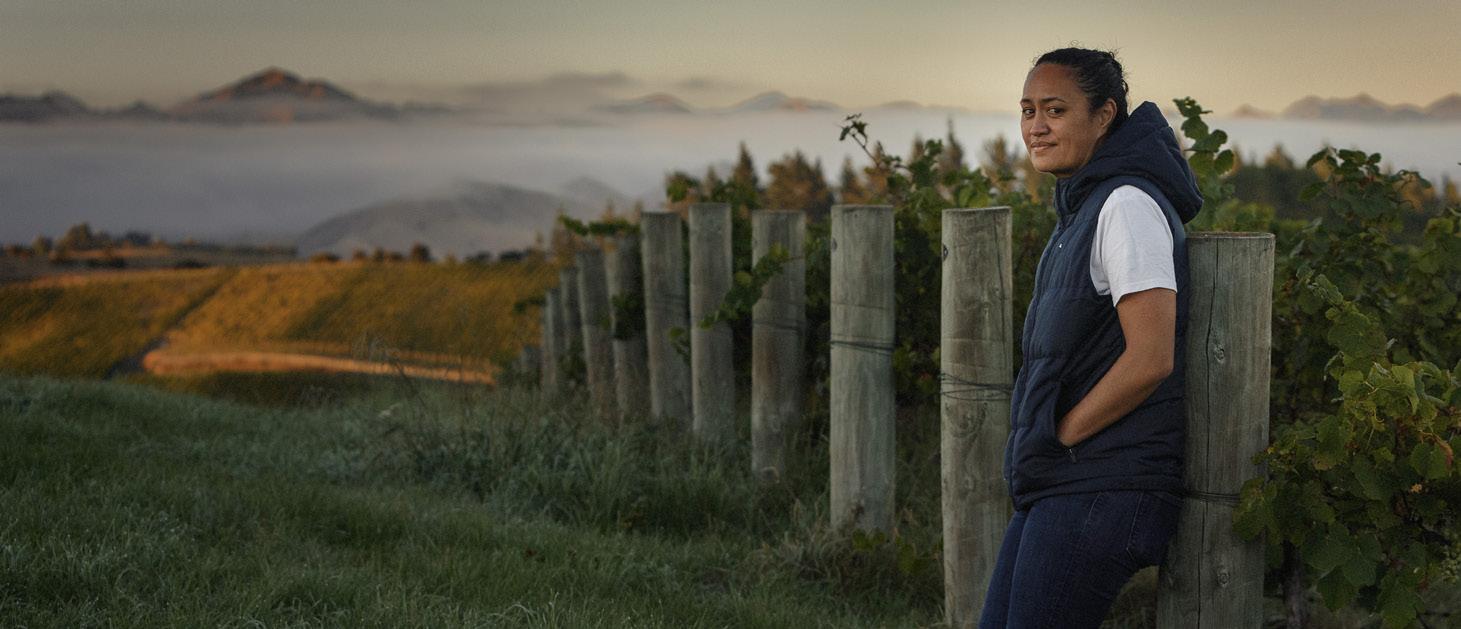
Bradley Hook of the Resilience Institute shared advice with the industry in the lead up to vintage, explaining that identifying emotions like anger, sadness and fear can we a powerful tool in building resilience. “Name them, tame them and try to reframe them.” Despite the myriad pressures, the industry could call on learnings from the previous two years to prepare, said Spy Valley’s Amanda Johnson. If 2020 was a “dress rehearsal” for Covid-19 vintage, then 2022 was showtime.
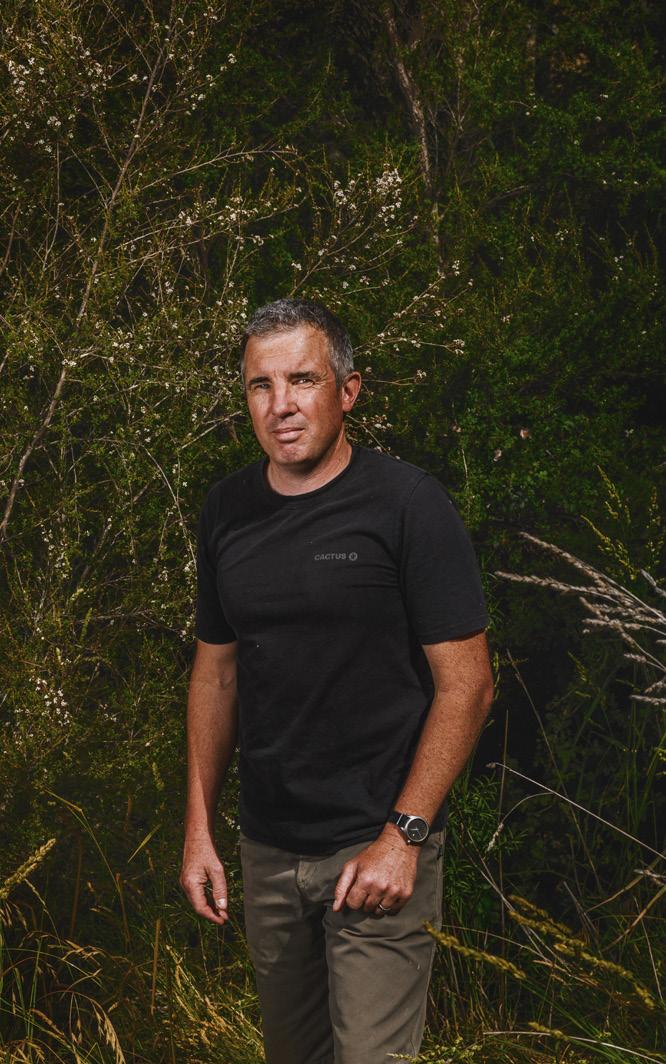
Vintage 2022 was a baptism of fire for many young cellar hands, with labour shortages putting inexperienced crews under the pump. That in turn put pressure on supervisors, said Rose Family Estate winemaker Tommaso Tadiello in the April edition, talking of balancing his own roles with frequent checks on green recruits. “To be able to do your own part, but also be able to teach and supervise the newbies in a proper manner, has kept us busy.” The edition also continued a series of stories on new talent in the wine industry, including Santiago Vadillo, originally from Mexico, who talked of enjoying both the wine and vine side of his cadetship with Villa Maria. “They’re two sides of the same coin, and at the end of the day it’s a beautiful coin.” The edition also focussed on a tourism reset underway since Covid-19 closed borders and crash-landed international wine tourism. A slow climb back to pre-Covid tourism numbers was a blessing in disguise, said Wine Tours by Bike operator Steve Hill. “It gives us all opportunity to think about what we want it to look like moving forward.”
Marlborough dodged a bullet in vintage 2022, “but not entirely”. That was the theme of a vintage wrap in the May Winepress, noting the impact of rainfall and Omicron on the season. “All harvests are different and this one was more different than most, with disease pressure on both fronts – Covid and botrytis,” said Marlborough Grape Growers Cooperative chief executive Mike Brown. The edition also looked at the “ship show” of supply lines, as companies lined up to get the 2022 vintage into bottles and off to market. On the bright side, the May edition checked out new technology being developed in Marlborough, along with aspirations for the region to become a recognised leader in agritech solutions in Australasia. “So Marlborough is not just exporting the world’s best Sauvignon Blanc, but we are also exporting that technology and the innovation created around that,” said Marlborough District Council economic development office Mark Unwin.
Winter brought plenty of pruning pressure, with the June Winepress carrying predictions that 70% of the pruning workforce would be inexperienced in 2022. Many of the longstay Recognised Seasonal Employer scheme workers, stranded by Covid-19 and in the region for the 2021 pruning season, had been able to return home to their families in the Pacific Islands. Their repatriation was a priority, with some having been in the country for nearly three years, but it left a hole in the workforce. However, the tough times of recent years strengthened relationships between wine companies, growers and contractors. “A good partnership will go a long way in getting a block pruned this year,” said Marlborough Winegrowers Association board member Gus Altschwager at the Wine Marlborough Pruning Field Day, covered in the June edition. The 2021 Wine Marlborough Lifetime Achievement Award was presented at the field day, with Dominic Pecchenino – cover model for the June Winepress - honoured for his service to the industry (see page 16).
Vintage stats were revealed in the July edition of Winepress, with Marlborough’s harvest coming in at 414,649 tonnes, up a welcome 54% on 2021’s meagre tally. The increase in volume came as a relief said Lawson’s Dry Hills group marketing manager Belinda Jackson in this edition. “We were desperately trying to keep up supply to our existing customers while attempting to put new opportunities on hold… Despite the challenges of the 2022 harvest, we are very pleased with our wines and relieved to be able to get back to full supply.” This edition also looked at the work done to repair vineyards in the year since the July 2021 floods, and checked out some ‘double hub-ble’, with both QuayConnect and Port Marlborough promising an inland port at Riverlands, to ease supply chain pressures. Our cover story was Matariki, with our nation’s first public holiday to mark the day. Jeff Sinnott and a crew from Constellation were some of the many to rise early to greet the day. “There were tears, there was plenty of laughter, but most of all there was an expression of aroha towards each other.”
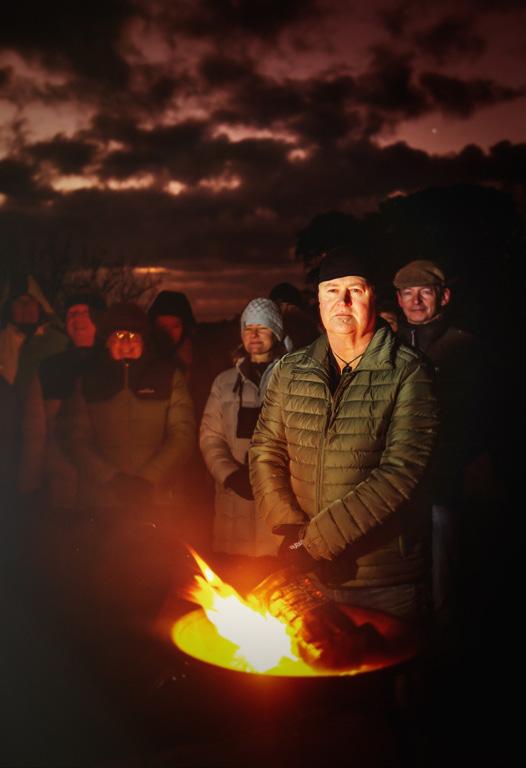
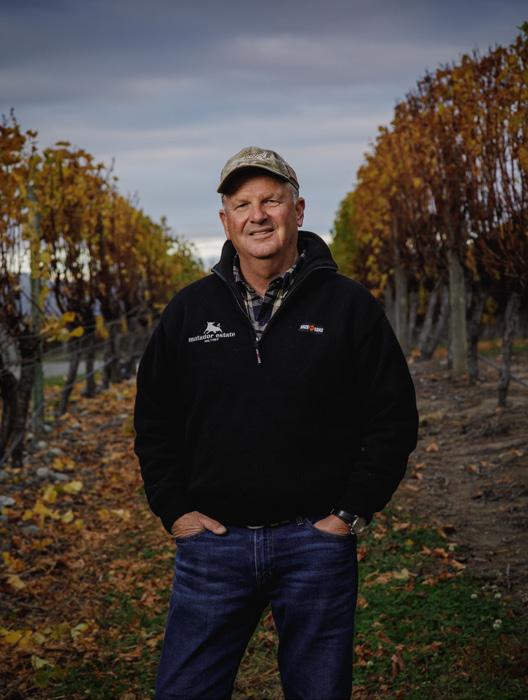
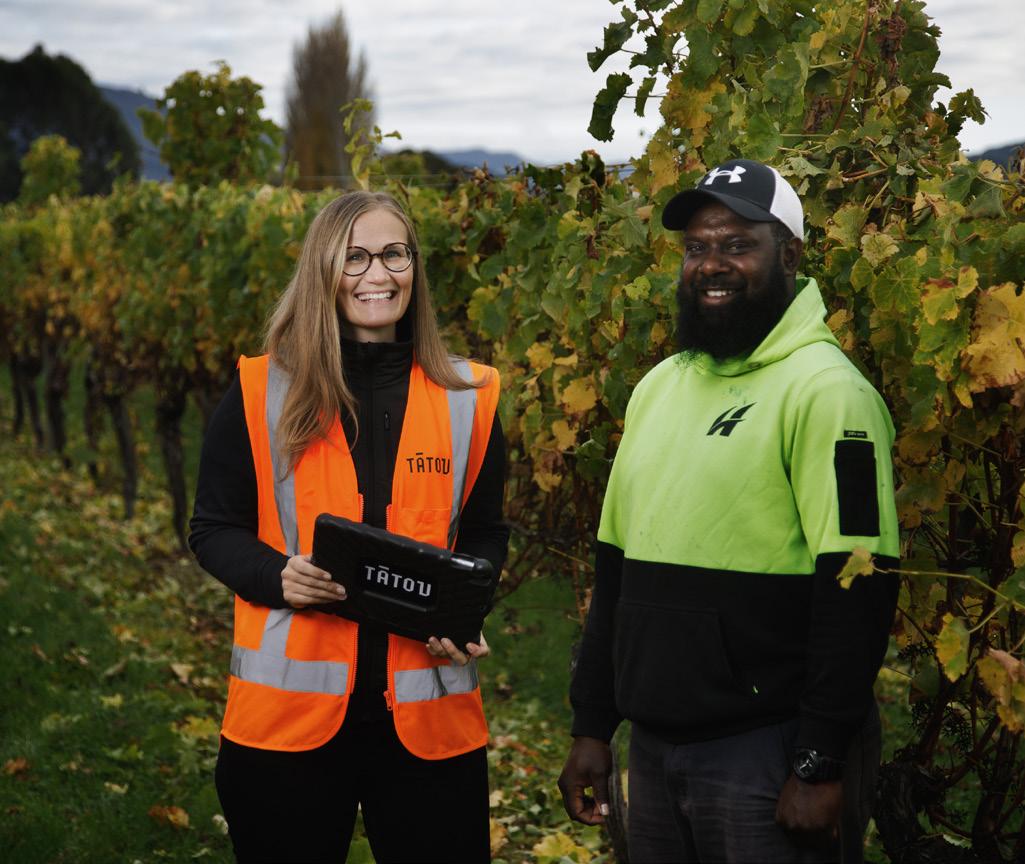
The second annual Cellar Operations Experience Day, organised by Nelson Marlborough Institute of Technology (NMIT) with support from Wine Marlborough, resulted in direct recruits for vintage 2023, as well as four new enrolments at NMIT. Loren Coffey from Wine Marlborough, Kathrin Jankowiec from Villa Maria, and Jerrym Lamb from Marisco presented insights. “It’s such an interesting and challenging industry and I think that’s because people are so passionate about it,” Kathrin told the 20 to 30 attendees. They were also taken to visit the Indevin and Lawson’s Dry Hills wineries, before returning to NMIT to mix and mingle with employers from the industry looking for staff for harvest.
Wine Marlborough’s 2022 Winery Waste Workshop included presentations from Marlborough District Council soil scientist Matt Oliver and recently appointed environmental protection officer Tonia Stewart. The event, held online to minimise Covid-19 risks, attracted 53 participants from 33 companies. Winery wastewater and winery waste streams, including grape marc, continue to be a major project and focus area. Wine Marlborough enjoys a positive and collaborative working relationship with council, which is charged with compliance, allowing for engagement with wineries to share successes or continuously improve their operations. The timing of the Winery Waste sessions has been reviewed, with the aim to hold them in October or November to give wine companies the chance to improve systems prior to vintage.
Wine Marlborough once again put together information and resources to support industry through a safe harvest, including information from Marlborough Roads, Marlborough Lines, Sustainable Winegrowing New Zealand, the New Zealand Winegrowers Biosecurity team and the New Zealand Transport Agency.
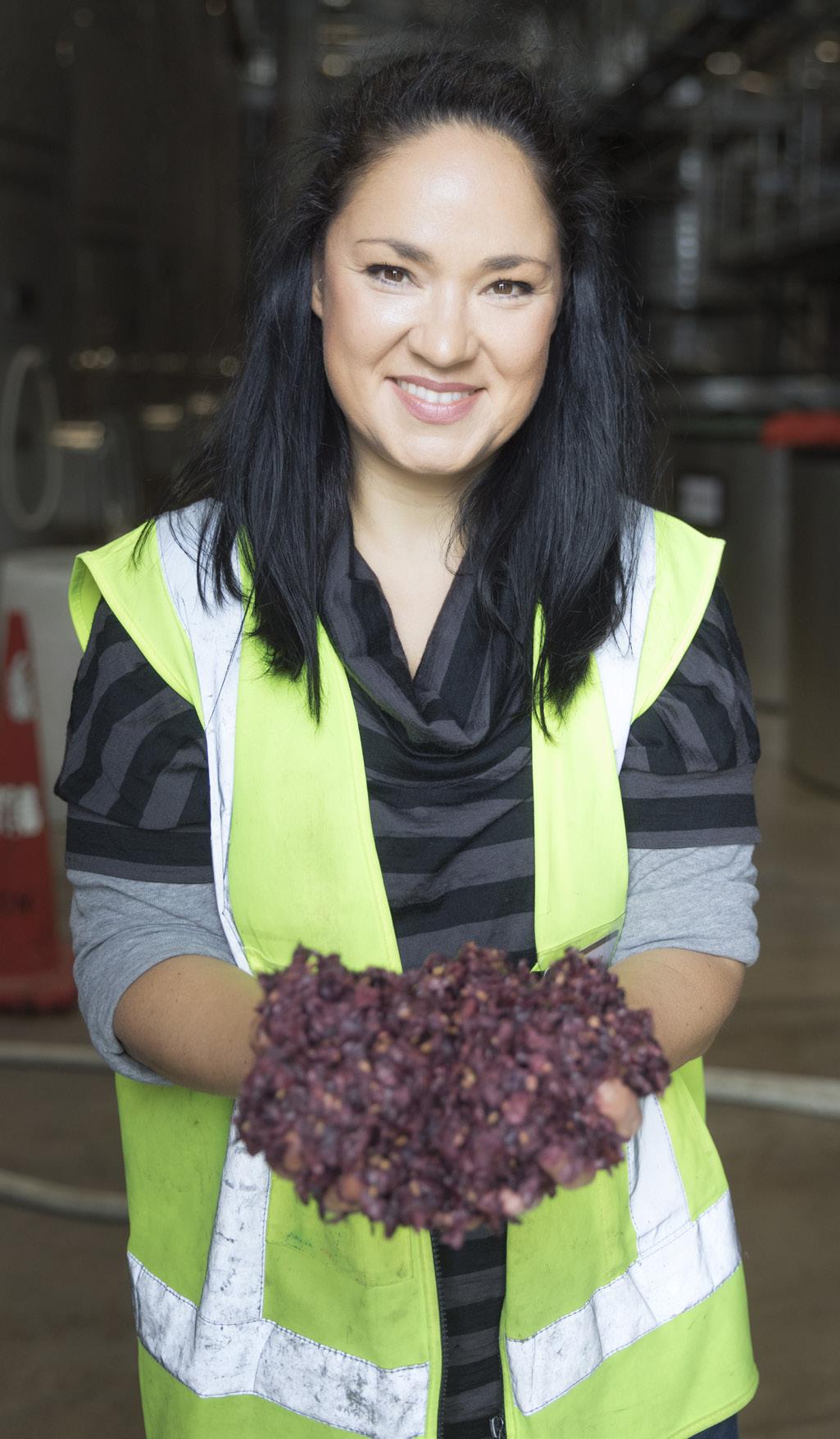
The annual Winter Pruning Field Day was hosted at Matador Estate and sponsored by TasmanCrop. The event attracted nearly 100 attendees from 60 businesses, and included presentations from New Zealand Ethical Employers chief executive Tanya Pouwhare, Sarah White from Rural Support Trust, and Marlborough Winegrowers Association board member Gus Altschwager. Field modules
included mechanical options with Marcus Wickham, Craig Sheridan and Alex Martin; alternative pruning with Mark Allen; pruning wound protection with Jess Wilson and Dion Mundy; and vine balance and physiology with Jeff Sinnott. The Wine Marlborough Lifetime Achievement Award was presented to Dominic Pecchenino (see page 16) at the event.
• We’re used as the key source of information for Marlborough’s wine region
• We highlight key issues and support members’ understanding
• We build understanding and culture around corporate social responsibility
“It’s such an interesting and challenging industry and I think that’s because people are so passionate about it.”
Kathrin Jankowiec
Bec Norton was awarded the Wine Marlborough Scholarship at Nelson Marlborough Institute of Technology (NMIT), as she juggled her wine and viticulture studies with winery lab work, her emerging small label Tettonica, and a growing young family. “You do our day job and make your wine the way you are employed to. But then having the opportunity to do your own thing on the side is pretty cool,” said Bec in the June 2022 Winepress.
A photo shoot in Marlborough wineries captured the excitement and camaraderie of wine work in the heart of New Zealand’s industry, says Wine Marlborough marketing and communications manager Sarah Linklater. “It’s easy to see why you’d come here for a harvest experience.” The nationwide attraction campaign fell under the Ministry for Primary Industries' Opportunity Grows Here programme, taking a Marlborough focus.
Wine Marlborough piloted a partnership with the New Zealand Motor Caravan Association (NZMCA) and a small number of people came to Marlborough to help out in roles such as tractor drivers, hand pickers and cellar hands. For Angie and Nige Boyd (January 2022 Winepress) life on the row was just what they were looking for. “It’s made a huge difference to our lifestyle," said Angie of her van in the vines.
The Primary Industry Capability Alliance (PICA) Capability Research and Insights Forum shared strategies to attract, grow and retain a talented and resilient workforce in New Zealand’s food and fibre sectors. Wine Marlborough advocacy manager Nicci Armour says the forum offered excellent insight into the best return on investment for attraction strategies and covered topics such as the true cost of transience in the dairy industry, Generation Z, and the environment.
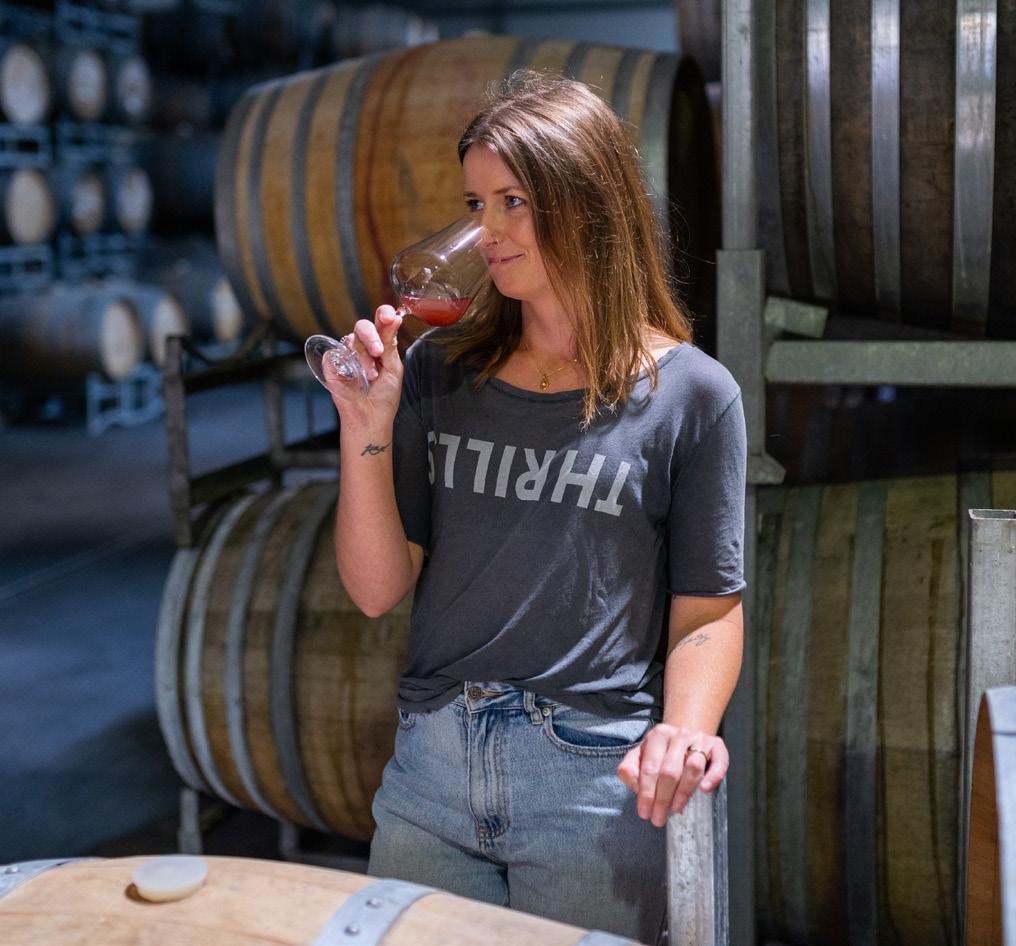
Tahryn Mason from Villa Maria became the 2022 Marlborough Corteva Young Viticulturist of the Year on July 7, in a competition held at Giesen House in Rapaura.
Tahryn (see page 14) went on to win the national final at Bankhouse Estate in Marlborough, Congratulations also goes to Jess Marston from Giesen Wines who came second and to Daniel Clearwater from Constellation Brands who came third. The competition is made possible thanks to all the national and regional sponsors, including BDO, Gascoigne Wicks, Hortus, PlaceMakers Rural, Waterforce, JTC Viticulture, and our regional speaker sponsor Harcourts Marlborough.
Wine Marlborough general manager Marcus Pickens has a seat on the Marlborough Regional Skills Leadership Group (RSLG) with wine one of the five key sectors featured in the Regional Workforce Plan. “This assisted with setting the regional objectives for the wine sector,” says Marcus. The RSLG agreed that the best pathway forward was to support Wine Marlborough in the development of its own Workforce Development Plan in collaboration with Muka Tangata (People, Food and Fibre).
The Tonnellerie de Mercurey Young Winemaker of the Year Competition is an opportunity for ambitious young people become future leaders. There were a record-breaking 10 contestants in the 2022 Marlborough competition, with Marisco’s Alun Kirby (see page 15) taking the top title. Thomas Jordaan, from Vavasour, came second and Ruby McManaway, from Yealands, took third position.
• Develop and maintain strong and wide networks
• Unite stakeholders, and guide and influence decision makers
• Create distinctive culture and regional identity
From October 2021 to January 2022, 40 of Marlborough’s 53 physical wineries completed a series of surveys to help us understand how the region’s wine industry was progressing towards recruitment for vintage 2022. We projected that the region’s wineries remained approximately 10% understaffed going into vintage by January, with high variability in recruitment across wineries. Recruitment rates for Kiwis was up, but all wineries experienced a huge gap in experience, and it was clear a buffer in staff numbers was required heading into a Covid-19 peak period.
Data collected in Marlborough supported the New Zealand Winegrowers (NZW) case to government for a class border exception for skilled vintage staff. Strong connections with our members meant we could rapidly respond to and support this case when it was presented in December/ January. Wine Marlborough put members directly in touch with NZW, which facilitated the process alongside the Ministry for Primary Industries (MPI).
to test the mechanisms for developing and planning the industry’s workforce and defining the scope of a workforce plan at the regional level. A major focus of the plan is industry-driven outcomes that support the current and future needs of our businesses and our people.
Wine Marlborough has participated in the Recognised Seasonal Employer (RSE) scheme conference for many
Wine Marlborough received funding from MPI for a resilience workshop, which made it free for members to attend. This was timely support heading into a pressured vintage, and 60 participants took advantage of the online workshop with the Resilience Institute, resulting in excellent feedback. Facilitator Bradley Hook told attendees how to recognise stages in a downward spiral, and respond rapidly to offset them. “We call resilience the learned ability to bounce - to recognise when we are on a downward spiral and bounce forward rather than back.”
Wine Marlborough held a series of conversations with a wide cross-section of industry members, as part of a new workstream aimed to support the current and future development of Marlborough’s wine industry’s workforce. The project now has a steering group, which is supporting advocacy manager Nicci Armour on a six-month sprint
years. The 2022 event marked the 15th anniversary of the scheme, and had a theme of Voices of the Pacific, hearing from delegates from the nations involved. Discussions included the RSE Policy Review, which will result in inevitable changes and updates. It will be vital to be engaged in this at all levels, says Wine Marlborough advocacy manager Nicci Armour. “Wine Marlborough will support the efforts of New Zealand Ethical Employers and NZW, who will be directly involved in the review and will consult with us.”

• Forecasting and research is undertaken to inform our thinking and guide our outputs
• Wine Marlborough are the champions for members and represent their rights and interests
• We help members stay ‘match-fit’ by supporting their resilience and wellbeing
A major focus of the plan is industry-driven outcomes that support our current and future needs of our businesses and our people.Bradley Hook led a Resilience Workshop in the lead up to vintage
The Marlborough Wine Show Celebration Lunch was cancelled in 2021, due to the complexity of holding events during Covid-19 Alert Level 2 restrictions. Marlborough instead devised a plan to celebrate the provenance of the winning wines, with trophies awarded within the vineyards, wineries and cellar doors they hailed from. The photos taken over the two days of presentations captured the story, people, and places behind the wines.
Seven of the 18 trophies awarded went to 2021 wines, including the QuayConnect Champion Wine of the Show, which went to the Saint Clair Wairau Reserve Sauvignon Blanc 2021, also winner of the WineWorks Champion Sauvignon Blanc trophy. Two new trophies were awarded for the first time in 2021: the WineWorks Champion Alternate Style Sauvignon Blanc, won by Sound of White “Barrel Fermented” Sauvignon Blanc 2019; and the Vit Management Ltd Best Organic Wine, for the Giesen Single Vineyard Clayvin Pinot Noir 2017. The Marlborough Museum Legacy Award was awarded to the wine producer with the highest scores from three vintages within a 10-year period, and went to Framingham Select Riesling, 2011, 2016 and 2019. A special thanks to our naming rights sponsor QuayConnect, as well as all our trophy sponsors.
Wine Marlborough’s objective for Sauvignon Blanc Day 2022 was to connect Sauvignon Blanc lovers around the world with our wine region. We collaborated with regional tourism organisation Destination Marlborough and created a social media campaign of short inspiring videos that transported wine lovers to Marlborough two weeks before #SauvBlancDay. The campaign reached 1.3 million people on Instagram, and the posts were seen 1.4m times, with 49.1k engagement. Our website received 1.3k visitors and there were 581 page views of the toolkit.
Dominic Pecchenino, a stalwart of Marlborough’s wine industry, was presented with the Wine Marlborough
• Events are used to help members shine, sell and create relationships
• We celebrate the activities of our members and community that reflect our region’s unique reputation
• The Marlborough wine story is clear and understood by members, industry, stakeholders, community and consumers
Stewart Maclennan and Kyle Thompson with a trio of trophies from the Marlborough Wine Show. Photo Richard Briggs
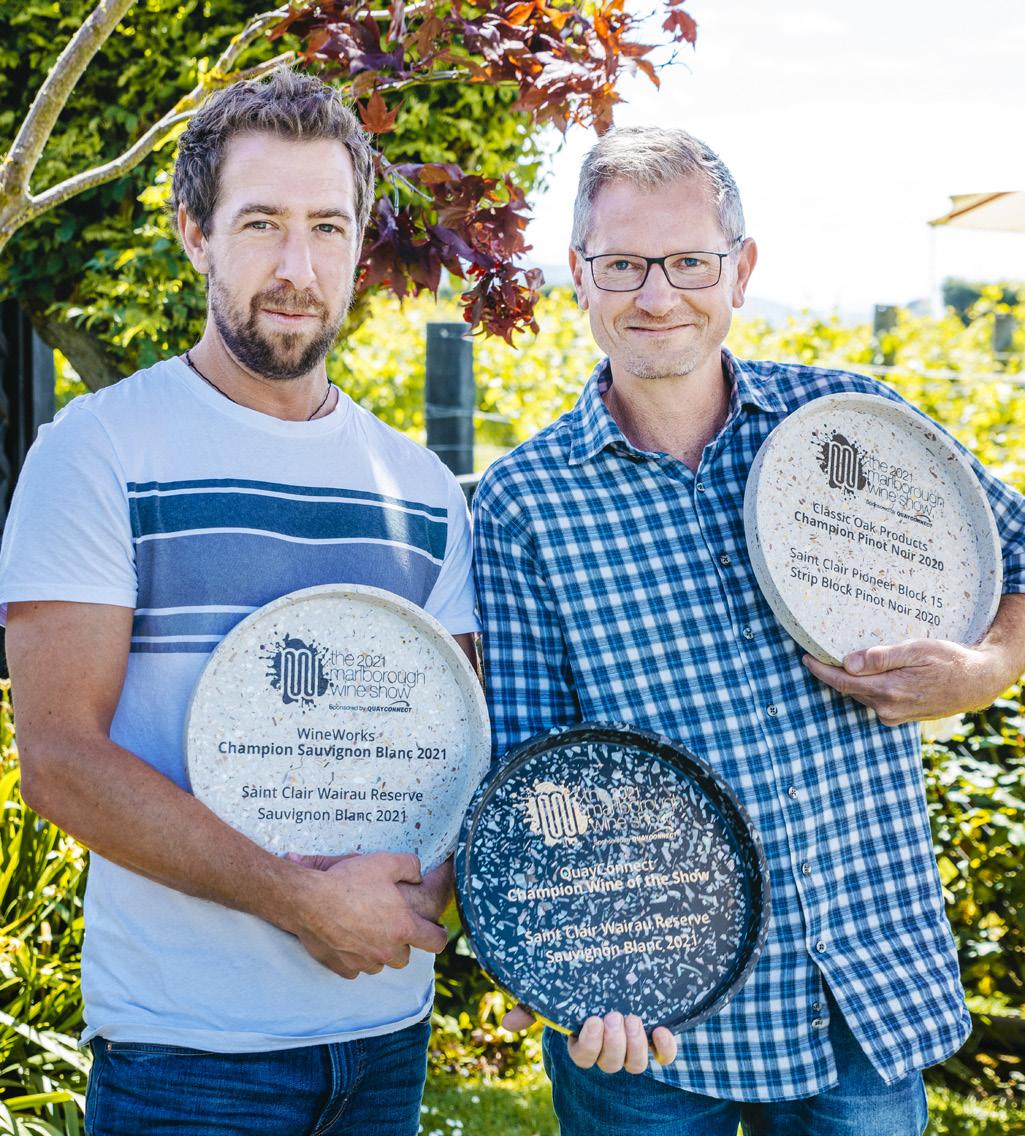
Lifetime Achievement award at Matador Estate in May 2022. See more on page 16.
The 2022 Marlborough Wine Show, sponsored by QuayConnect, celebrated the people and places behind Marlborough’s best wines. Best Low Alcohol wine was added to the trophies, along with new subregional judging of Chardonnay, joining Pinot Noir and Sauvignon Blanc. Interest in the Coterie Wine of Provenance, which awards the best single vineyard current release wine from any class, soared, with 122 entries, up from 45 in 2021. That trophy takes the subregional lens and then drills down to vineyard expression, says chief judge Ben Glover, who was joined by guest judges James Millton and Sydney-based group beverage manager for Solotel, Annette Lacey MW, along with a team of 11 senior judges and six associate judges. Stu Marfell was shadow chief judge for the 2022 show.
The iconic Marlborough Wine & Food Festival will take place on Saturday February 11, 2023, at Renwick Domain in the heart of New Zealand wine country. The festival is owned and run by Wine Marlborough and is an excellent opportunity to showcase our great wine region. This long-running event is also a perfect platform for the wine industry and community to come together and celebrate.
Member Engagement Understand our members and their needs, and use this to create value for them.
Community Build distinctive culture and regional identity within the industry and the Marlborough community.
People People are everything. We support the education, training, attraction, ongoing career development, and wellbeing of people in the industry and understand our role in a sustainable workforce for the Marlborough wine industry.
Communication Connect stakeholders to our region in ways that are meaningful and tangible to build the reputation of Marlborough’s wine region.
Data & Information Objective 1: We need to plan to capture important information on key issues in advance, so we can forecast and prepare, not just respond. Objective 2: Internally create efficiency, transparency and measurement of our activities.
Environment We support best practice at a local level, enabling members to have access to good guidance and resources. We share the industry’s environmental efforts and our successes.
Establish Wine Marlborough’s position on corporate social responsibility and lead industry by enabling members to have access to good guidance and resources.
This photo Spy Valley bottling manager and volunteer firefighter Ryan Anderson. Photo Jim Tannock. September 2022 Winepress.
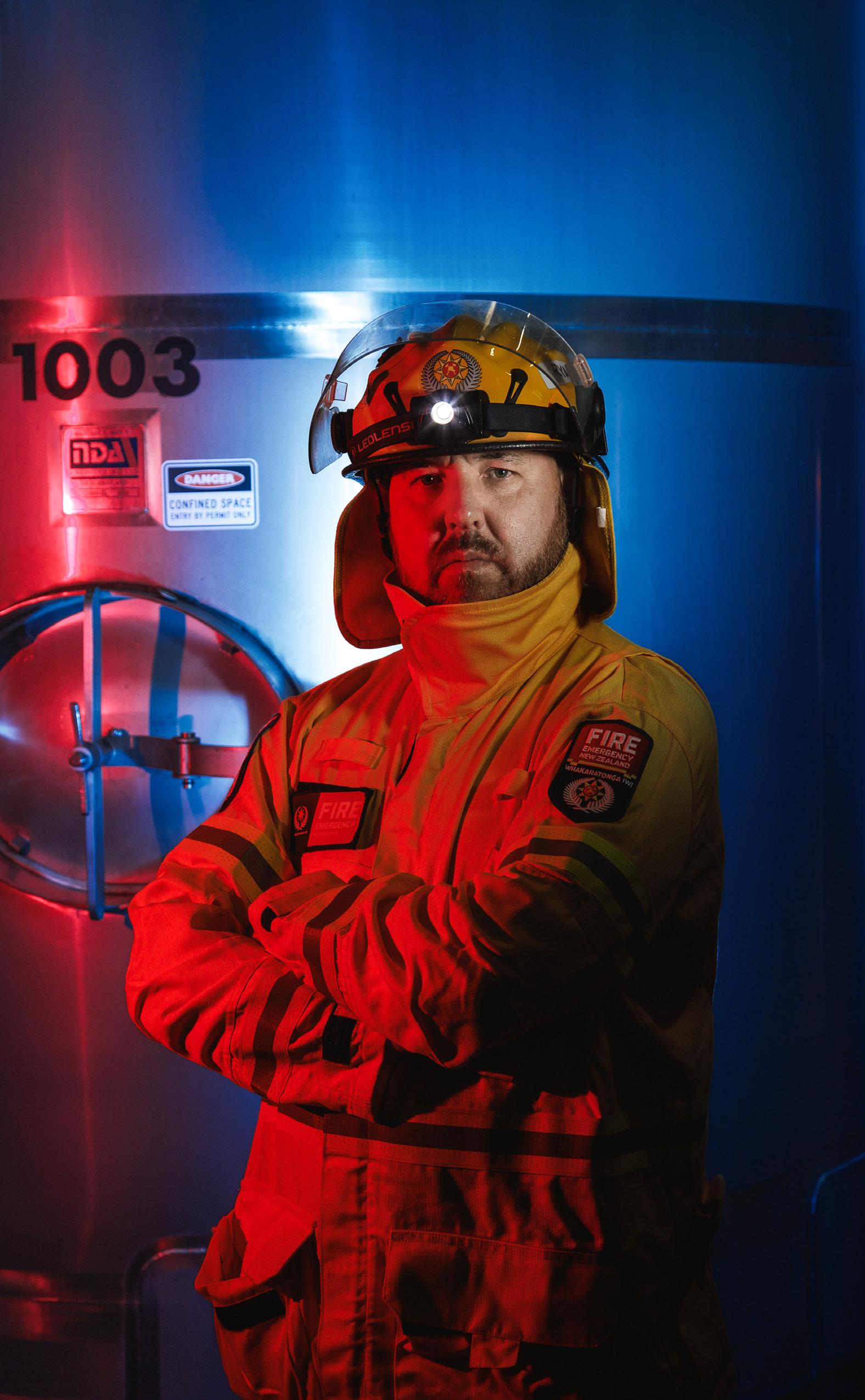
FOR THE past four years Wine Marlborough has used a well-considered strategy – created with input from staff and the Marlborough Winegrowers Association board – to direct our attention and intentions. It has been revisited and revised over the past few years and remains our guiding document.
The myriad challenges of the past 24 months have required us to be even more focused on the strategic goals of our industry organisation, to ensure we make headway in these difficult times, within the resources available.
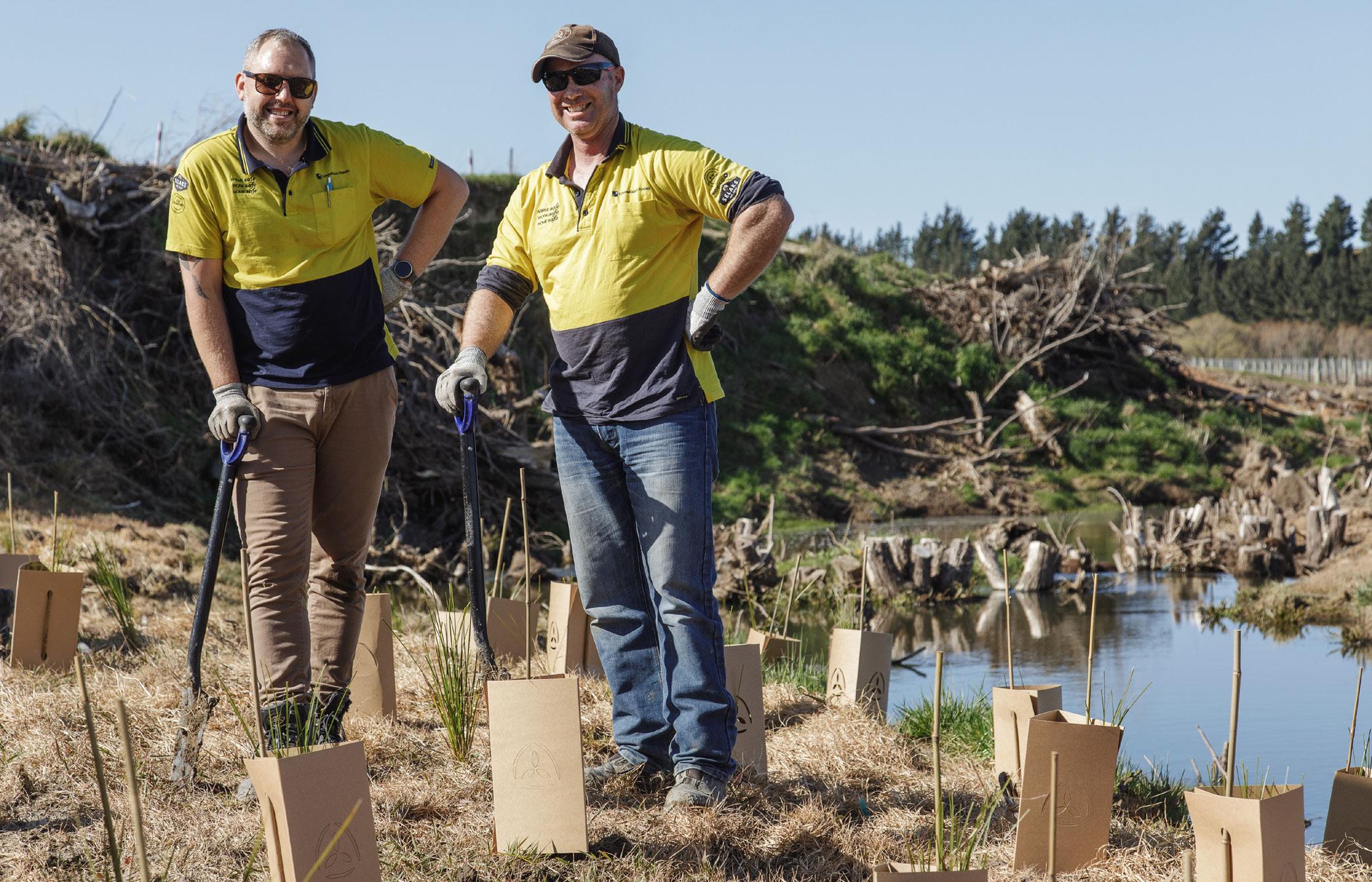
For the first few years of our strategic plan, the Wine Marlborough team followed a 90-day planning and activity cycle. More recently we adapted to a 60-day planning cycle, to follow the board meeting timetable. While this was acceptable for a time, the template had become more of a day-to-day task list than an action plan to help focus us as a team on making progress against the overarching and longer-term strategic themes.
It was recommended that we seek out a business coach to help us to address some of the challenges we faced as a team and support the development of an annual plan for the business. We engaged the help of Nigel Teal, of Chrysalis Enterprise in Nelson, and received a funding contribution of $3,000 from the regional Business Partner Network, with our contribution matching that for eight sessions spread out over the year.
The first year of this annual plan development and implementation cycle will be unique, as we transition into the best process. In the future it will require more input from the board to set annual focus areas and objectives,
Over the past several months, the Wine Marlborough team has been focused on developing our annual plan for the 2022-2023 financial year, and this was phased in three reports to the board. The first board report in March established the annual plan process and concept, and the second board report in June recommended focus areas and objectives based on research and review. Annual SMART goals (specific, measurable, achievable, relevant, time bound) were then developed by the team for each focus area objective.
They were reviewed and refined extensively, ensuring there was a balance of new and existing activity. We also reviewed existing activity with a new lens, understanding the purpose of our events and established long term goals for how these activities progress the focus area objectives.
Each SMART goal was allocated by role, allowing for overlaps between the team in focus areas, then assigned with tactics in an operating plan and presented with a budget for the third report in July. The recommended objectives were presented in nine focus areas (themes) identified through the review, including Member Engagement, Community, People, Communication, Data and Information, Environment, and Corporate Social Responsibility (see page 12). This process has helped us focus on where we are best placed to support our industry members and build towards a long-term, strategic vision for the Marlborough wine region. To read more on the Wine Marlborough annual plan go to wine-marlborough.co.nz/resources
SUBURBAN AUCKLAND might not seem the logical start line for a stellar career in grape growing.
But the 2022 Corteva Young Viticulturist of the Year believes his urban upbringing gives him a fresh perspective on the science and art of his trade. “I am probably from one of the least traditional backgrounds,” says Tahryn Mason, a vineyard supervisor at Villa Maria’s Seaspray Cluster in the Awatere Valley. “I don’t have any preconceived ideas of what it should be.”
Tahryn was studying history and philosophy at Auckland University in 2016 when he got his first holiday job running nets over a Villa Maria vineyard, which led to casual work in the vines. “Somewhere along the line it just sort of clicked that sitting in a room at uni wasn’t where I wanted to be,” says Tahryn. He hadn’t been attracted to sciences at school, but the work got him thinking about building that knowledge, and he began taking courses through the Primary ITO, eventually climbing to his Level 4 certificate while on the job. “All the knowledge I have built is self-taught, under my own steam,” he says.
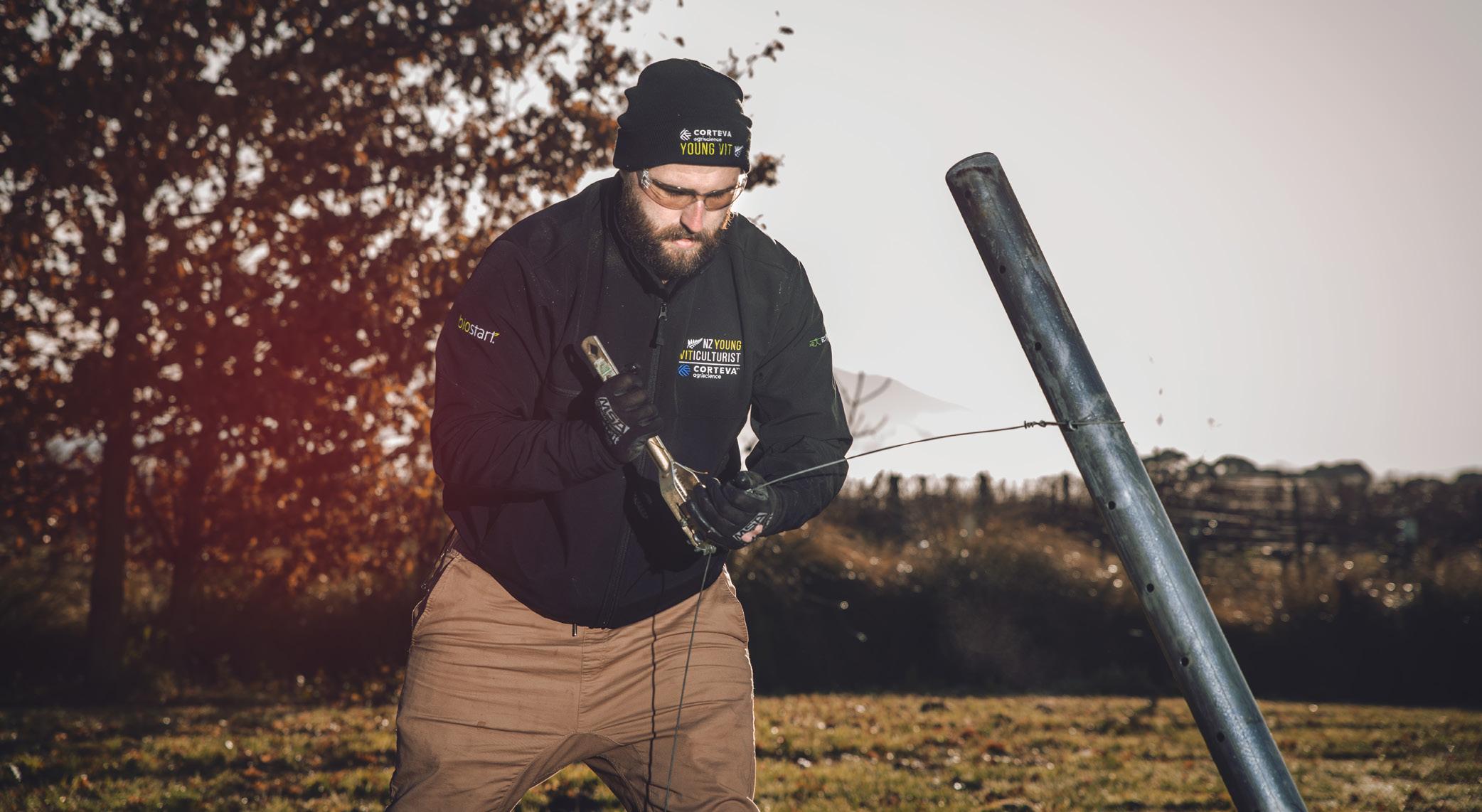
He also grew and tested that knowledge through the Young Vit competitions, starting with the Auckland/ Northern regional event in 2019. “I have treated it as a real learning opportunity every single year,” he says after four regional competitions and two tilts at the national title.
“Trying to learn from my mistakes and plug the gaps in my knowledge has really driven me to work hard to become better year in year, year out.”
The more he learns the more committed he is to viticulture, which he describes as “an interesting take” on farming. “You are trying to grow a really premium product and it’s a really fine balance between art and science.” Research is key to decision making, alongside management plans, wine styles and the block itself, he says. “It can
be quite subjective. In the same company two different winemakers might want to do two different things.” And he loves that the work he does in the field – whether that’s through inputs or the absence of inputs - can achieve all of that. “That’s the fascinating bit for me.”
When he won the Marlborough regional finals in July, not long before his 30th birthday, Tahryn knew the final at Indevin’s Bankhouse Estate in Marlborough on August 30 would be his last opportunity to compete, before aging out of the competition. But he’s got no intention of slowing his drive to learn and push boundaries, keen to explore a better way of growing.
The more he considers farming, the more convinced Tahryn is that we’ve “got things backwards”, he says. “We should focus a lot more energy and attention into growing the soil and building resilience in the soil first, and building that through long term to the grapes.”
The Seaspray Cluster is comprised of two convetional and two organic vineyards, but for Tahryn the answer is not one or the other. He abhors herbicide strips and vineyards mowed to a “bowling green” aesthetic, and admits he is guilty of “being lulled into an organic versus conventional dynamic”. But he’s now keen to explore a more nuanced “toolkit” for vineyards that will make them more resilient, reducing the need for reactive measures. “In the future a mixed model between the two will revolutionise the industry,” he says. The full version of this story ran in the October/November Winegrower Magazine
“All the knowledge I have built is selftaught, under my own steam.”
Tahryn MasonPhoto Richard Briggs
WHETHER FERMENTING peaches from his childhood garden, or throwing oak chips at a tank of Sauvignon Blanc, Alun Kilby has long had an appetite for new things. “I have always wanted to be a little bit outside of the box and not run by the recipe,” says the 2022 Tonnellerie de Mercurey Marlborough Young Winemaker of the Year. “Even at university with our microvins, my friend and I ended up making fortified wine… Just because everyone else was making normal wine.”
Alun, who is production winemaker at Marisco Vineyards, took the regional title in late September, up against the competition’s largest ever regional field, with 10 competitors putting themselves to the test. Vavasour’s Thomas Jordaan came second and Ruby McManaway, from Yealands, came third. Marlborough regional committee chair and former winner Emily Gaspard-Clark says the winemakers were of a really high calibre. “I think we have a great group of young leaders coming through and the industry will be in good hands as they move up the ranks.”
Alun grew up making fruit wine with his mother in the kitchen of his family home in Matakana, with frozen berries defrosted and fermented, and fruit plucked from the pear, peach and feijoa trees outside. They weren’t all good, but they were all an experience, he says. “You learn lots, even working with fruit wine.” He was practical by nature, and fascinated by biology, “so yeasts and conversions came naturally to me”.
He started holiday vineyard work when he was 13, and went on to undertake the Bachelor of Viticulture and Oenology at Lincoln University. While studying, he worked the 2014 vintage at Marisco and “loved it”, as his past experiences fell into place. On finishing his degree the next year, Alun went to Central Otago, before returning to Marisco as a cellarhand in late 2015, with plans to make it to winemaker.

Some overseas vintages followed, but Alun returned to Marisco, and was made assistant winemaker in 2018, then production winemaker this year. “I have learned a lot being in the role,” he says, noting that being at one winery, on and off, since 2014, including “multiple harvests”, has allowed him to embed knowledge of the processes, and what each block, additive or remedy brings to a wine. “I do feel that in winemaking you have to spend a certain amount of time in one place to be able to get a good grasp of context. Once you have that information tucked away in your brain, you can
take that anywhere from there.”
Working in the state-of-the-art winery has also given him opportunity to be involved in Sauvignon Blanc trials, including hot, high solids, and barrel ferments, learning more about the versatility of Marlborough’s flagship variety. One of those trials involved adding a tonne’s worth of oak chips to an 80,000-litre tank of Sauvignon, fermented warm with high solids. That successful trial created a new thread in Marisco’s programme, he says, pleased to be involved in pushing outside the box. “I am always out there to try new things and learn new things, and the competition does help with that as well,” he says. “It gives you insights and networking advantage as well.”
In the judging section of this year’s competition, Alun felt lucky to have Chardonnay on the table. “We had just graded our Chardonnay… so I was going in with a lot of information.” And while the marketing pitch is often a challenge for him, this year’s brief – to blend and market a Rosé for the Swedish Meatball and Flapjack Innovation Expo – was so entertaining, he could set his nerves aside. “It was just too good. I went for a darker stye Rosé and a bit of sweetness. But made it with a salty minerality so you’d still want to drink it with food.”
It’s been a long time between berry wines, but Alun’s mother, who passed away in 2014, is a constant inspiration. “She is the one who has driven me to be in this industry and I always felt that with this competition she would be super proud of me; she would be stoked,” he says. “So I do it more for her than for me.”
WHEN DOMINIC Pecchenino arrived at Matador Estate in 1993, Marlborough winegrowers were plagued by phylloxera and sceptical of plant science. Three decades on, the viticulturist has been recognised for his tireless work to leverage innovation, research, collegiality, and a lot of hard work to improve the way we grow wine.
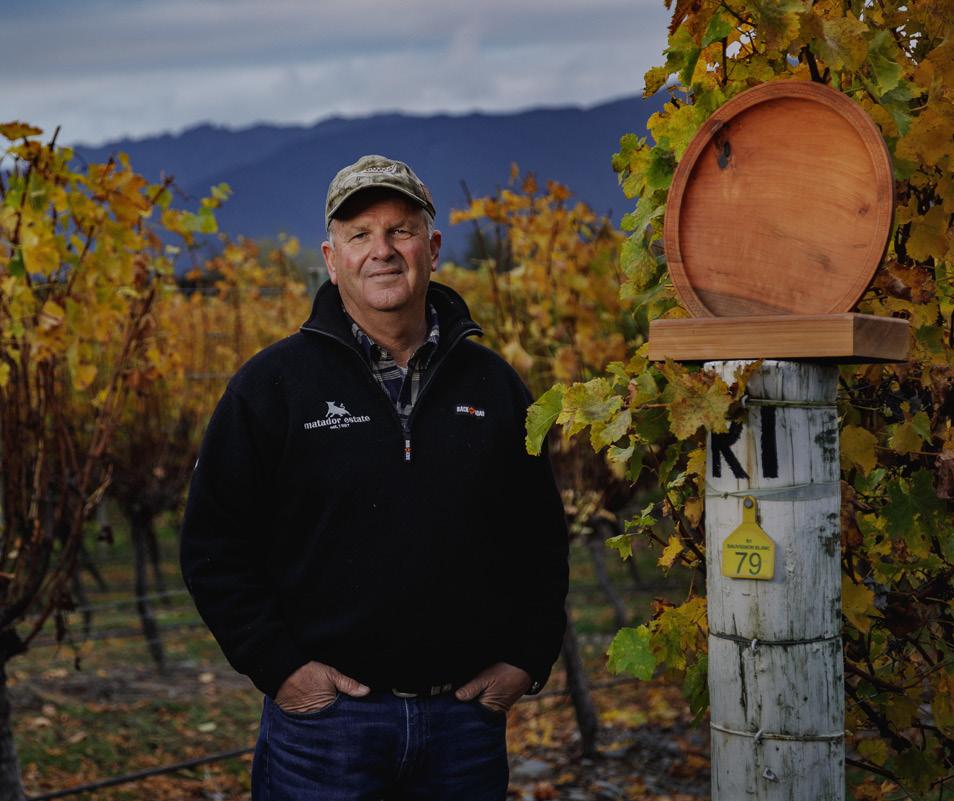
Dominic “shows the true spirit of what has made our industry great”, said Marlborough Winegrowers board chair Beth Forrest in presenting the 2021 Wine Marlborough Lifetime Achievement Award to Dominic at Matador Estate in May. He arrived in Marlborough from California “with science and research as his yardstick and this has never wavered,” she added. “He helped transform our understanding of the science of growing good grapes.”
Dominic says the award is a “great honour” that came out of the blue. “You work a long time in an industry and to be recognised for doing something that makes a difference is probably the best honour you can get.”
And make a difference he has, spending 16 years on the New Zealand Winegrowers (NZW) board and around 15 years as chair of NZW’s research committee. “He was also an instigator for the annual Grape Days, as he strongly believed that research being undertaken around the country needed to be shared with growers throughout the country,” says Wine Marlborough general manager Marcus Pickens, speaking of the “fresh eyes and international experience” Dominic brought to the region.
Dominic has been involved in producing books on botrytis and Sauvignon Blanc, as well as a manual on frost protection, and his passion for industry betterment saw him sit on the Bragato Research Institute board for five years, from concept to launch, and as acting chair in its first year. He was the first to trial mechanical thinning in New Zealand and continued that work through to mechanical shaking for botrytis control. He also led the pack in transforming vine prunings and winery waste into compost and mulch for the vineyard. “I have always had an inquisitive mind,” says Dominic. “I have always wanted to figure out why things happen; to know how I can change it or fix it.” Sometimes you can’t do anything about it, he says. “But a lot of times I have found the majority of our problems are pretty simple. You just have to look at it from a different point of view.”
It’s a far cry from growing up in a butcher’s shop in California, with dreams of life as a pro-footballer. After a year playing at junior college, “I figured I would never make a living at that”, Dominic says, choosing a geology major instead. He was paying his way through school with a job in a deli when he met the owner’s friend Julio Gallo, of the winemaking Gallo family. Dominic explained that he liked
landscapes, glaciers, earthquakes and wine, but not rocks or the prospect of hunting for oil. Julio convinced him to explore viticulture, and Dominic undertook a degree in plant science at California State University, Fresno, where most of his classmates came from vineyards. “I had no idea what a grapevine was really about, but I went to school and learned and worked hard.” He went on to join one of the largest grape growers in the world, working his way up from fertility and irrigation management to leading special projects, and four years after receiving his degree in plant science, went back for a master’s degree in viticulture.
Dominic’s growing expertise in phylloxera mitigation and replanting caught the eye of John Webber in 1993, and the viticulturist visited Marlborough to look at the 80-hectare Matador Estate, at that stage the largest privately owned contiguous vineyard in the country.
Phylloxera was biting but markets were growing at pace, “and they needed fruit”, says Dominic. “And whatever they could get was better than nothing.” He devised a redevelopment programme that maximised production while replanting on resistant rootstock, using better viticulture to mitigate the aphid’s impact.
Having read Dominic’s handwritten report, John immediately asked him to either visit four times a year as consultant or move to Marlborough to work for Matador. Dominic and his wife Marianne decided their young family was ripe for “a bit of an adventure” and they set off for Blenheim in February 1994. “At the time there were a lot of people growing grapes in Marlborough that did not know how to grow grapes,” says Dominic.
People were a bit “wary” of the Yank with newfangled ideas, and he’d be told that just because something happened in California didn’t mean it would happen in Marlborough as well. “But science is science,” Dominic says. “No matter what hemisphere you are in.”
The full version of this story ran in the June 2022 Winepress Magazine
Dominic Pecchenino with the Lifetime Achievement Award. Photo Jim TannockOur vision
that Marlborough will be the world’s greatest wine region
Our strategy is to
From Left: Joanna May, Marcus Pickens, Sarah Linklater, Loren Coffey and Nicci Armour. Photo by Jim Tannock
Grape Grower Directors: Anna Laugesen
Nation nationa@gmail.com
Johnston (Deputy Chair)
michiel@eraduswines.co.nz
Sowman
Wine Company Directors: Beth Forrest (Chair) beth@forrest.co.nz
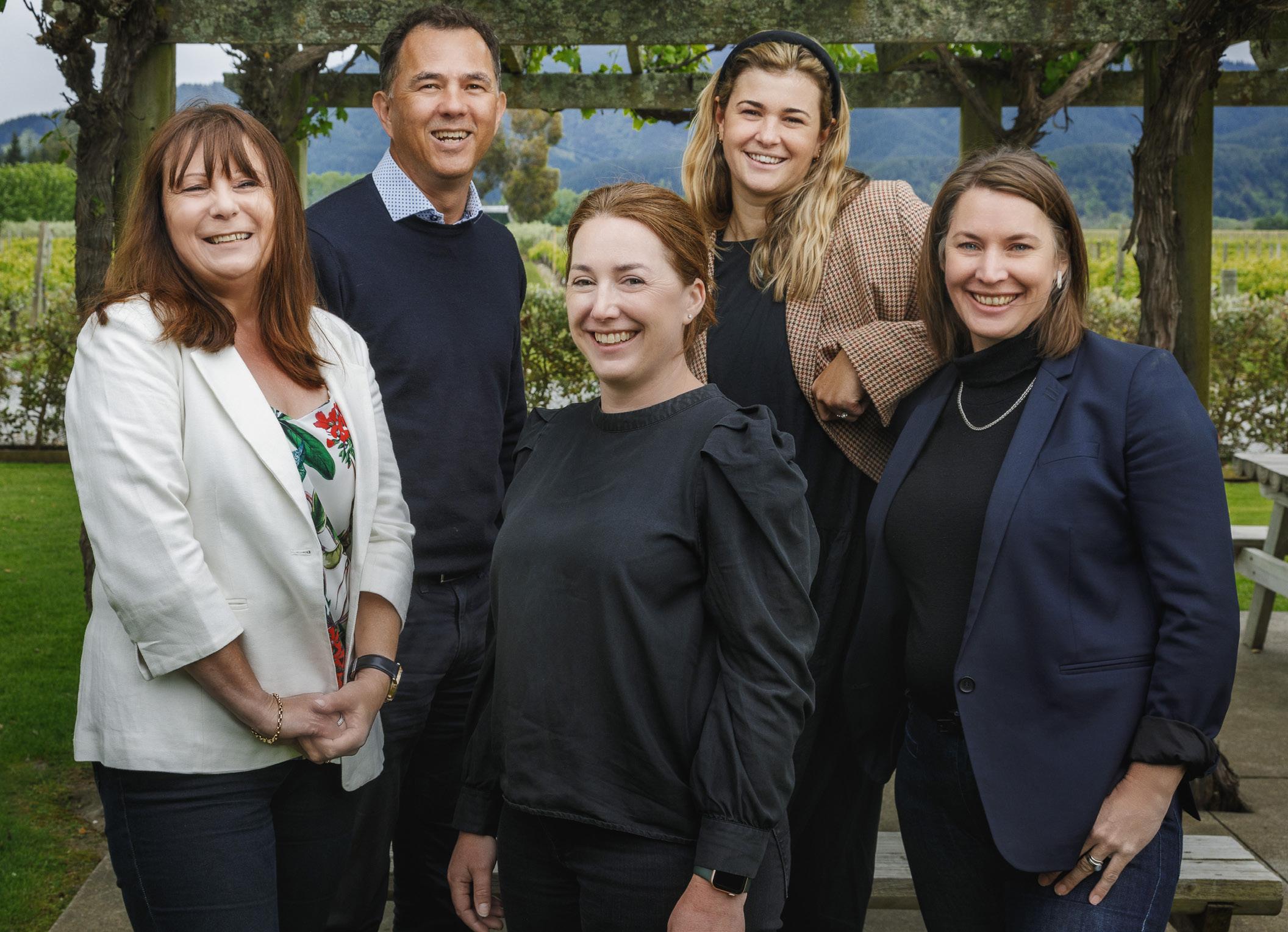
Damien Yvon damien@closhenri.com
Altschwager gus@akwines.net
Macdonald james@hunters.co.nz
Marfell jamie.marfell@pernod-ricard.com
by:
The Marlborough Winegrowers Association (MWG) was established over 40 years ago by elected members of the industry. Wine Marlborough Ltd is 100% owned by MWG and is governed by the MWG board of directors.
